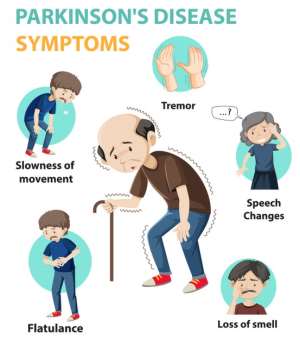
One of the famous people with Parkinson’s disease Is Michel J. Fox who was formerly a Hollywood Actor. He developed Parkinson’s at the early age of 29 years and has spent most of his life helping with research into the condition through his foundation.
PD is a progressive degenerative brain disease and occurs in about 1% of all adults greater than 60 years. It is a result of the loss or death of certain nerve cells that produce a chemical called Dopamine.
This is one of the chemicals that transmit messages between nerves. This loss results in a movement disorder (motor symptoms) as well as Non-Motor symptoms.
Motor Symptoms
Tremor, rigidity, soft voice, shuffling or slowing of gait, decreased swinging of arms, a forward-leaning posture, and the legs may feel restless or the need to move them. Late problems are balance and uncontrolled sudden movement called Dyskinesia.
Non-Motor Symptoms
These are present in most parts of the body from the brain to the sexual organs. Thinking and memory problems may be seen, as well as anxiety, depression, and hallucinations (seeing and hearing things). Speech may gradually become soft and in a monotone. The gut is not spared and may present with swallowing difficulties and constipation. Sexual problems include erectile dysfunction in men, with low libido and vaginal pain in women.
There are bladder problems, like leakage of urine, poor stream or inability to urinate (obstruction). Sleep problems include insomnia (inability to sleep), and increased daytime sleepiness. Some people may have sensory problems like numbness, tingling, pain, vision problems, and decreased sense of smell. With the skin, one of the incredibly early signs of PD before diagnosis is dry scaly skin and moderate amounts of dandruff on the scalp of an individual.
Treatment of Motor symptoms: After the diagnosis is made, the treatment is to control both the motor and nonmotor symptoms. Currently, there is no treatment to stop or slow down the nerve cells from dying. A neurologist usually takes care of the patient, but the primary care doctor can take care of a patient between neurologist visits.
There are different classes of medications that work to increase the amount of Dopamine or slow down the breakdown of Dopamine in the brain in order to help with motor symptoms. Apart from medications, Physical therapy, Speech and Occupational therapy, and Rock Steady Boxing will help with movement, flexibility, and balance. There are two surgical procedures used to help with some of the motor symptoms; Deep Brain Stimulation and Focused Ultrasound.
Treatment of non-Motor Symptoms: This will depend on the symptom. Medicines may be given for constipation, sleeplessness, memory and thinking problems, depression and anxiety, drooling, pain, fatigue or daytime drowsiness. One has to let a doctor know of these so they can be treated.
Social networking and Support groups for patients and caregivers are vital and keep one abreast with new treatments while providing support and socialization. Accra for example has a PD support group that meets once a month.
Other regions can also form support groups. To contact PD SUPPORT GROUP CALL: Esinam- 0244144379 or Mary – 0246190619.
If you enjoyed reading this, share it with family and friends
Dr. Barbara Entsuah MD. (Family Medicine Physician, Philanthropist, and Author)
#Loveyourbody




 NDC demands complete overhaul of security protocols at EC to safeguard electoral...
NDC demands complete overhaul of security protocols at EC to safeguard electoral...
 Ghana reaches interim deal with international bondholders — Finance Ministry
Ghana reaches interim deal with international bondholders — Finance Ministry
 Mahama to form joint army-police anti-robbery squads to safeguard 24-hour econom...
Mahama to form joint army-police anti-robbery squads to safeguard 24-hour econom...
 Another man jailed eight months over shrinking penis
Another man jailed eight months over shrinking penis
 Ghana to adjust external bond deal to meet IMF debt sustainability goals — Finan...
Ghana to adjust external bond deal to meet IMF debt sustainability goals — Finan...
 IMF negotiations: We've not failed to reach an agreement with bondholders; we’ve...
IMF negotiations: We've not failed to reach an agreement with bondholders; we’ve...
 EC begins recruitment of temporary electoral officials, closes on April 29
EC begins recruitment of temporary electoral officials, closes on April 29
 NPP lost the 2024 elections in 2022 due to inflation and cedi depreciation — Mar...
NPP lost the 2024 elections in 2022 due to inflation and cedi depreciation — Mar...
 Your good heart towards Ghana has changed; don’t behave like Saul - Owusu Bempah...
Your good heart towards Ghana has changed; don’t behave like Saul - Owusu Bempah...
 Wa West: NDC organizes symposium for Vieri Ward Women
Wa West: NDC organizes symposium for Vieri Ward Women
